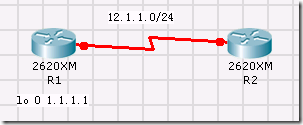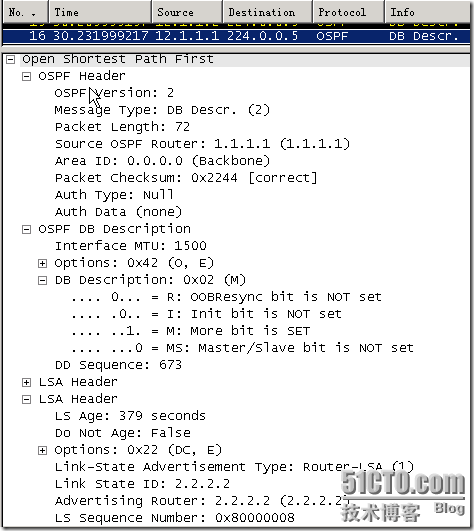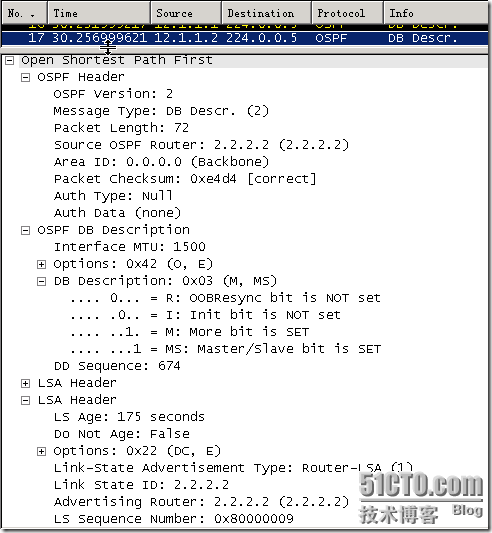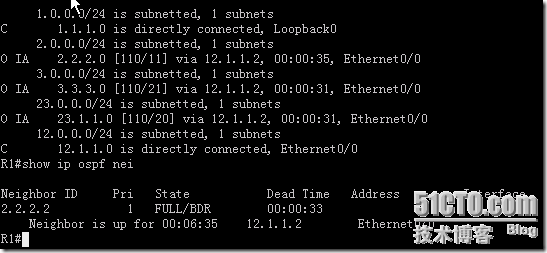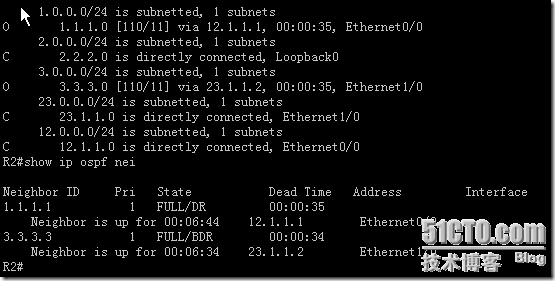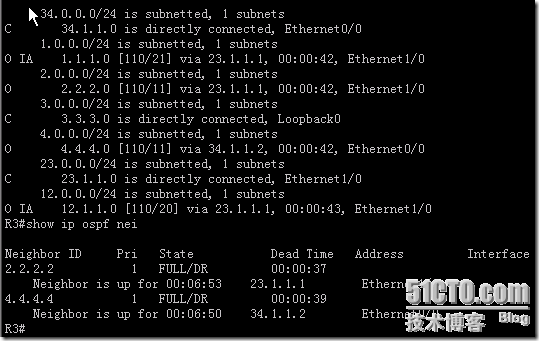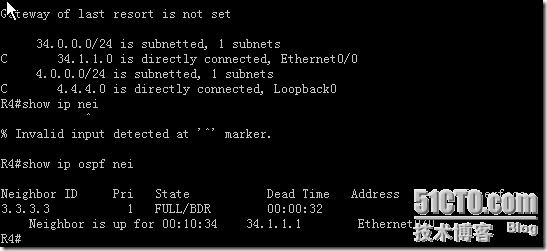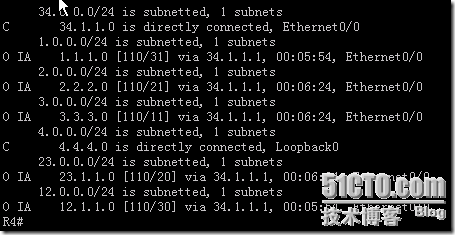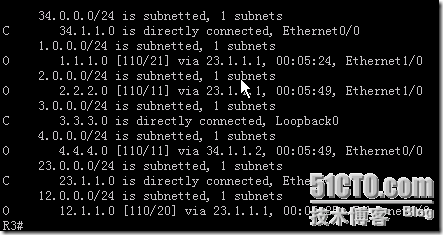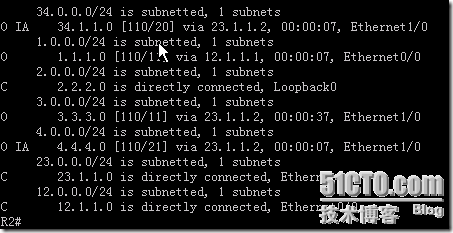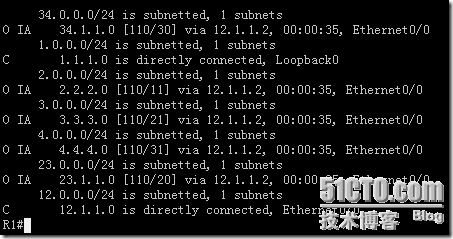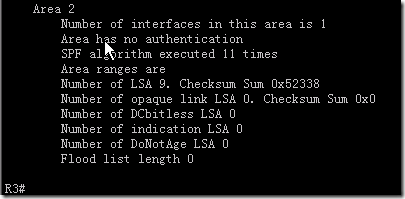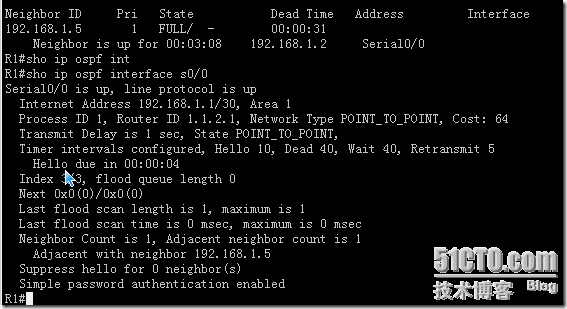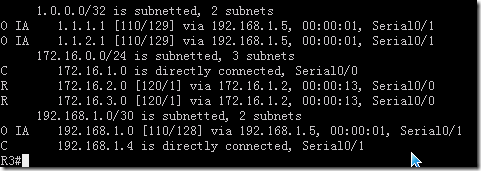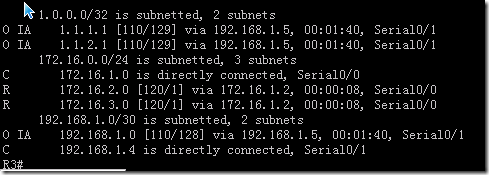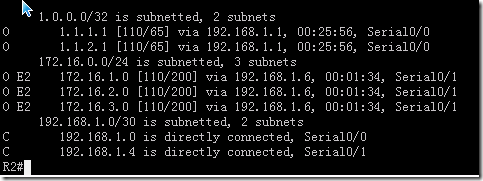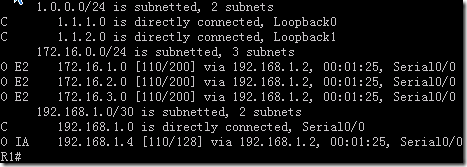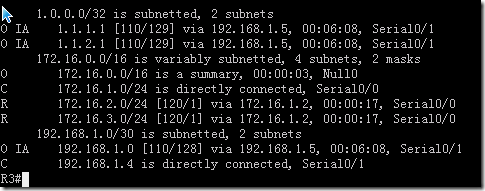Lab_2 OSPF
一.OSPF邻接关系的建立流程... 2
二.NBMA下的OSPF. 20
三.虚链路... 28
四.认证... 31
五.外部汇总/ospf与rip的重发布... 36
一. OSPF邻接关系的建立流程
1.Down: 初始化状态.
2.Attempt: 只适于NBMA网络,在NBMA网络中邻居是手动指定的,在该状态下,路由器将使用HelloInterval取代PollInterval来发 送Hello包.
3.Init: 表明在DeadInterval里收到了Hello包,但是2-Way通信仍然没有建立起来.
4.two-way: 双向会话建立.
5.ExStart: 信息交换初始状态,在这个状态下,本地路由器和邻居将建立Master/Slave关系,并确定DD Sequence Number,接口等级高的的成为Master。
6.Exchange: 信息交换状态,本地路由器向邻居发送数据库描述包,并且会发送LSR用于请求新的LSA
7.Loading: 信息加载状态,本地路由器向邻居发送LSR用于请求新的LSA
8.Full: 完全邻接状态,这种邻接出现在Router LSA和Network LSA中
Debug ip ospf packet
Debug ip ospf events
Debug ip ospf adj
Debug ip packet
状态
1.down 停止状态
2.init 初始状态 收到一个hello包后进入(形成邻居表)
3.two-way 双向状态 hello包中包含已知邻居列表 ,发现自己在hellow包中时,选举DR,BDR
4.exstart 准启动状态 挣选优先级(谁先说话/DR先发包)
5.exchange 交换状态 交换DBD(链路状态描述)分组僚属链路状态数据库(并返回ACK,进入下一个状态)
6.loading 加载状态 请求完整信息条目,发送LSU/返回LSUAck,进入下一个状态
7.full adjacency 全邻接状态 拓扑表同步(运行SPF/形成路由表/--转发数据库)
04:25:18: %LINK-3-UPDOWN: Interface Serial0/0, changed state to up
//打开S0/0接口
04:25:18: OSPF: Interface Serial0/0 going Up
//OSPF进程启动
04:25:18: IP: s=12.1.1.1 (local), d=224.0.0.5 (Serial0/0), len 64, sending broad/multicast
//发送hello包组播 由于debug ip ospf packet 无法捕获到发送的hello包内容,所以这里无显示
04:25:18: OSPF: Build router LSA for area 0, router ID 1.1.1.1, seq 0x8000000F
//构建LAS
04:25:19: %LINEPROTO-5-UPDOWN: Line protocol on Interface Serial0/0, changed state to up
R1#
04:25:25: IP: s=12.1.1.2 (Serial0/0), d=224.0.0.5, len 68, rcvd 0
04:25:25: OSPF: rcv. v:2 t:1 l:48 rid:2.2.2.2
aid:0.0.0.0 chk:F694 aut:0 auk: from Serial0/0
04:25:25: OSPF: Rcv hello from 2.2.2.2 area 0 from Serial0/0 12.1.1.2
//在S0/0收到来自12.1.1.2 的hello包,版本:2/类型:hello包/routerID:2.2.2.2/区域号:0/校验:F694/无验证/
04:25:25: OSPF: 2 Way Communication to 2.2.2.2 on Serial0/0, state 2WAY
//进入2way状态
04:25:25: OSPF: Send DBD to 2.2.2.2 on Serial0/0 seq 0x15C2 opt 0x42 flag 0x7 len 32
//通过S0/0发送DBD到2.2.2.2 ,序列号:0x15C2 flag 0x7,这是第一个DBD包,以后还会继续发,我为主
04:25:25: IP: s=12.1.1.1 (local), d=224.0.0.5 (Serial0/0), len 52, sending broad/multicast
04:25:25: OSPF: End of hello processing
04:25:25: IP: s=12.1.1.2 (Serial0/0), d=224.0.0.5, len 52, rcvd 0
04:25:25: OSPF: rcv. v:2 t:2 l:32 rid:2.2.2.2
aid:0.0.0.0 chk:A337 aut:0 auk: from Serial0/0
04:25:25: OSPF: Rcv DBD from 2.2.2.2 on Serial0/0 seq 0xEBF opt 0x42 flag 0x7 len 32 mtu 1500 state EXSTART
//在S0/0上收到到来自2.2.2.2的DBD包 序列号:0xEBF flag 0x7,这是第一个DBD包,以后还会继续发,我为主,并进入准启动状态
04:25:25: OSPF: NBR Negotiation Done. We are the SLAVE
//经过一轮协商,发现我的routerid小于2.2.2.2所我为从
04:25:25: OSPF: Send DBD to 2.2.2.2 on Serial0/0 seq 0xEBF opt 0x42 flag 0x2 len 72
//给2.2.2.2发送一个DBD包确认,告诉他,我为从
04:25:25: IP: s=12.1.1.1 (local), d=224.0.0.5 (Serial0/0), len 92, sending broad/multicast
04:25:25: IP: s=12.1.1.2 (Serial0/0), d=224.0.0.5, len 92, rcvd 0
04:25:25: IP: s=12.1.1.2 (Serial0/0), d=224.0.0.5, len 56, rcvd 0
04:25:25: OSPF: rcv. v:2 t:2 l:72 rid:2.2.2.2
aid:0.0.0.0 chk:2B5E aut:0 auk: from Serial0/0
04:25:25: OSPF: rcv. v:2 t:3 l:36 rid:2.2.2.2
aid:0.0.0.0 chk:F5CF aut:0 auk: from Serial0/0
04:25:25: OSPF: Rcv DBD from 2.2.2.2 on Serial0/0 seq 0xEC0 opt 0x42 flag 0x3 len 72 mtu 1500 state EXCHANGE
04:25:25: OSPF: Send DBD to 2.2.2.2 on Serial0/0 seq 0xEC0 opt 0x42 flag 0x0 len 32
04:25:25: IP: s=12.1.1.1 (local), d=224.0.0.5 (Serial0/0), len 52, sending broad/multicast
04:25:25: IP: s=12.1.1.1 (local), d=224.0.0.5 (Serial0/0), len 56, sending broad/multicast
04:25:25: OSPF: Database request to 2.2.2.2
04:25:25: OSPF: sent LS REQ packet to 12.1.1.2, length 12
//
04:25:25: IP: s=12.1.1.1 (local), d=224.0.0.5 (Serial0/0), len 96, sending broad/multicast
04:25:25: IP: s=12.1.1.2 (Serial0/0), d=224.0.0.5, len 52, rcvd 0
04:25:25: IP: s=12.1.1.2 (Serial0/0), d=224.0.0.5, len 96, rcvd 0
04:25:25: OSPF: rcv. v:2 t:2 l:32 rid:2.2.2.2
aid:0.0.0.0 chk:A33B aut:0 auk: from Serial0/0
04:25:25: OSPF: rcv. v:2 t:4 l:76 rid:2.2.2.2
aid:0.0.0.0 chk:1373 aut:0 auk: from Serial0/0
04:25:25: OSPF: Rcv DBD from 2.2.2.2 on Serial0/0 seq 0xEC1 opt 0x42 flag 0x1 len 32 mtu 1500 state EXCHANGE
//双方交换DBD包,并确认,进入到EXCHANGE状态,向12.1.1.2放松链路状态请求(LS REQ),收到2.2.2.2来的LSU
04:25:25: OSPF: Exchange Done with 2.2.2.2 on Serial0/0
04:25:25: OSPF: Send DBD to 2.2.2.2 on Serial0/0 seq 0xEC1 opt 0x42 flag 0x0 len 32
//回复给2.2.2.2一个DBD包,确认双方数据库是否同步
04:25:25: IP: s=12.1.1.1 (local), d=224.0.0.5 (Serial0/0), len 52, sending broad/multicast
04:25:25: OSPF: Synchronized with 2.2.2.2 on Serial0/0, state FULL
04:25:25: %OSPF-5-ADJCHG: Process 1, Nbr 2.2.2.2 on Serial0/0 from LOADING to FULL, Loading Done
//进入全邻接状态
04:25:26: OSPF: Build router LSA for area 0, router ID 1.1.1.1, seq 0x80000010
04:25:26: IP: s=12.1.1.1 (local), d=224.0.0.5 (Serial0/0), len 108, sending broad/multicast
04:25:26: IP: s=12.1.1.2 (Serial0/0), d=224.0.0.5, len 108, rcvd 0
04:25:26: OSPF: rcv. v:2 t:4 l:88 rid:2.2.2.2
aid:0.0.0.0 chk:3067 aut:0 auk: from Serial0/0
04:25:28: IP: s=12.1.1.2 (Serial0/0), d=224.0.0.5, len 64, rcvd 0
04:25:28: OSPF: rcv. v:2 t:5 l:44 rid:2.2.2.2
aid:0.0.0.0 chk:1EF9 aut:0 auk: from Serial0/0
04:25:28: IP: s=12.1.1.1 (local), d=224.0.0.5 (Serial0/0), len 64, sending broad/multicast
04:25:28: IP: s=12.1.1.1 (local), d=224.0.0.5 (Serial0/0), len 68, sending broad/multicast
R1#
04:25:30: IP: s=12.1.1.1 (local), d=224.0.0.5 (Serial0/0), len 108, sending broad/multicast
04:25:30: IP: s=12.1.1.2 (Serial0/0), d=224.0.0.5, len 108, rcvd 0
04:25:30: OSPF: rcv. v:2 t:4 l:88 rid:2.2.2.2
aid:0.0.0.0 chk:3063 aut:0 auk: from Serial0/0
R1#
04:25:33: IP: s=12.1.1.2 (Serial0/0), d=224.0.0.5, len 64, rcvd 0
04:25:33: OSPF: rcv. v:2 t:5 l:44 rid:2.2.2.2
aid:0.0.0.0 chk:5C17 aut:0 auk: from Serial0/0
//同步数据库,并发送LSA确认
1.1.点到点网络, 比如T1线路,是连接单独的一对路由器的网络,点到点网络上的有效邻居总是可以形成邻接关系的,在这种网络上,OSPF包的目标地址使用的是224.0.0.5,这个组播地址称为AllSPFRouters.
2.1.广播型网络,比如以太网,Token Ring和FDDI,这样的网络上会选举一个DR和BDR,DR/BDR的发送的OSPF包的目标地址为224.0.0.5,运载这些OSPF包的帧的目标MAC地址为0100.5E00.0005;而除了DR/BDR以外的OSPF包的目标地址为224.0.0.6,这个地址叫AllDRouters.
3.1.NBMA网络, 比如X.25,Frame Relay,和ATM,不具备广播的能力,因此邻居要人工来指定,在这样的网络上要选举DR和BDR,OSPF包采用unicast的方式
4.1.点到多点网络 是NBMA网络的一个特殊配置,可以看成是点到点链路的集合. 在这样的网络上不选举DR和BDR.
5.1.虚链接: OSPF包是以unicast的方式发送
在P-P网络,路由器是以组播方式将更新报文发送到组播地址224.0.0.5.
在P-MP和虚链路网络,路由器以单播方式将更新报文发送至邻接邻居的接口地址.
在广播型网络,DRother路由器只能和DR&BDR形成邻接关系,所以更新报文将发送到224.0.0.6,相应的DR以224.0.0.5泛洪LSA并且BDR只接收LSA,不会确认和泛洪这些更新,除非DR失效 在NBMA型网络,LSA以单播方式发送到DR BDR,并且DR以单播方式发送这些更新.
二.NBMA下的OSPF
R1=center
R2=ISP
R3=Branch1
R4=Branch2
-----------------------------------------------------------------------------------
step1:
frame-relay switching
int s1/0
ISP(config-if)#encaps frame-relay
ISP(config-if)#no arp frame-relay
ISP(config-if)#no frame-relay inverse-arp
ISP(config-if)#frame-relay intf-type dce
ISP(config-if)#clo ra 64000
ISP(config-if)#frame-relay lmi-type ansi
ISP(config-if)#frame-relay route 102 int s1/1 201
ISP(config-if)#frame-relay route 103 int s1/2 301
ISP(config-if)#no shut
int s1/1
ISP(config-if)#encaps frame-relay
ISP(config-if)#no arp frame-relay
ISP(config-if)#no frame-relay inverse-arp
ISP(config-if)#frame-relay intf-type dce
ISP(config-if)#clo ra 64000
ISP(config-if)#frame-relay lmi-type ansi
ISP(config-if)#frame-relay route 201 int s1/0 102
ISP(config-if)#no shut
int s1/2
ISP(config-if)#encaps frame-relay
ISP(config-if)#no arp frame-relay
ISP(config-if)#no frame-relay inverse-arp
ISP(config-if)#frame-relay intf-type dce
ISP(config-if)#clo ra 64000
ISP(config-if)#frame-relay lmi-type ansi
ISP(config-if)#frame-relay route 301 int s1/0 103
ISP(config-if)#no shut
-----------------------------------------------------------------
#Central
step1:
Central(config)#int lo 0
Central(config-if)#ip add 1.1.1.1 255.255.255.0
Central(config-if)#ip ospf network point-to-point
Central(config)#int s1/1
Central(config-if)#encapsulation frame-relay
Central(config-if)#no arp frame-relay
Central(config-if)#no frame-relay inverse-arp
Central(config-if)#frame-relay lmi-type ansi
Central(config-if)#ip add 123.1.1.1 255.255.255.0
Central(config-if)#frame-relay map ip 123.1.1.2 102 broadcast
Central(config-if)#frame-relay map ip 123.1.1.3 103 broadcast
Central(config-if)#no shut
step2:
router ospf 1
Central(config-router)#route-id 1.1.1.1
Central(config-router)#network 123.1.1.1 0.0.0.0 a 0
Central(config-router)#network 1.1.1.1 0.0.0.0 a0
step3:
Central(config)#router ospf 1
Central(config-router)#neighbor 123.1.1.2
Central(config-router)#neighbor 123.1.1.3
---------------------------------------------------------------
#Branch1
step1:
Branch1(config)#int lo 0
Branch1(config-if)#ip add 2.2.2.2 255.255.255.0
Branch1(config-if)#ip ospf network point-to-point
Branch1l(config)#int s1/0
Branch1l(config-if)#encapsulation frame-relay
Branch1l(config-if)#no arp frame-relay
Branch1(config-if)#no frame-relay inverse-arp
Branch1(config-if)#frame-relay lmi-type ansi
Branch1(config-if)#ip add 123.1.1.2 255.255.255.0
Branch1(config-if)#frame-relay map ip 123.1.1.1 201 broadcast
Branch1(config-if)#frame-relay map ip 123.1.1.3 201 broadcast
Branch1(config-if)#no shut
step2:
router ospf 1
Branch1(config-router)#route-id 2.2.2.2
Branch1(config-router)#network 123.1.1.2 0.0.0.0 a 0
Branch1(config-router)#network 2.2.2.2 0.0.0.0 a0
step3:
Branch1(config)#int s1/0
Branch1(config)#ip ospf priority 0
----------------------------------------------------------------
#Branch2
setp1:
Branch2(config)#int lo 0
Branch2(config-if)#ip add 3.3.3.3 255.255.255.0
Branch2(config-if)#ip ospf network point-to-point
Branch2(config)#int s1/2
Branch2(config-if)#encapsulation frame-relay
Branch2(config-if)#no arp frame-relay
Branch2(config-if)#no frame-relay inverse-arp
Branch2(config-if)#frame-relay lmi-type ansi
Branch2(config-if)#ip add 123.1.1.3 255.255.255.0
Branch2(config-if)#frame-relay map ip 123.1.1.1 301 broadcast
Branch2(config-if)#frame-relay map ip 123.1.1.2 301 broadcast
Branch2(config-if)#no shut
step2:
router ospf 1
Branch1(config-router)#route-id 3.3.3.3
Branch1(config-router)#network 123.1.1.3 0.0.0.0 a 0
Branch1(config-router)#network 3.3.3.3 0.0.0.0 a0
step3:
Branch2(config)#int s1/2
Branch2(config)#ip ospf priority 0
此时如果no掉
branch1的 frame-relay map ip 123.1.1.3 201 broadcast
branch2的 frame-relay map ip 123.1.1.2 301 broadcast
就会出现有路由但无法PING通的现象,链路层封装失败
解决方案1
在Central上NO掉邻居
然后在S1/1上输入 ip ospf network point-to-mulitpoint
最好是在branch上也输入,不输入也行
解决方案2
子接口
为什么在NBMA上central没有指邻居为什么 还能收到Hello包
三.虚链路
R2(config)#router ospf 1 R2(config-router)#area 1 virtual-link 3.3.3.3 R2(config-router)#exit R2(config)#exit |
R3(config)#router ospf 1 R3(config-router)#area 1 virtual-link 2.2.2.2 R3(config-router)#exit R3(config)#exit |
命令中的area 2 指出有一条虚链路存在于区域2中。
virtual-link 172.16.255.9指出创建虚链路的对端R3路由器的router id。
注意:使用router id,而不是接口ip.
四.认证
查看R1和R2的路由表
明文认证
在R1上启用OSPF的明文认证
在R2上启用OSPF的认证
R2(config-if)#s0/0
R2(config-if)#ip ospf authentication-key cisco
R2(config-if)#ip ospf authentication-
基于MD5的密码接口认证
首先在R1和R2上关闭明文认证
R1(config-if)#ip ospf authentication message-digest
R1(config-if)#ip ospf message-digest-key 1 md5 cisco
R2(config-if)#ip ospf authentication message-digest
R2(config-if)#ip ospf message-digest-key 1 md5 cisco
区域认证
在R1上启用区域的明文认证
在R2上启用区域明文认证
MD5
R1(config)#router ospf 1 R1(config-router)#area 1 authentication message-digest R1(config-router)#interface serial 0/0 R1(config-if)#ip ospf message-digest-key 1 md5 cisco R2(config-if)#exit R2(config)# |
R2(config)#router ospf 1 R2(config-router)#area 1 authentication message-digest R2(config-router)#exit R2(config)#int s0/0 R2(config-if)#ip ospf message-digest-key 1 md5 cisco R2(config-if)#exit R2(config)# |
当在接口出现两条md5的密码配置命令时,R2路由会发送两份不同的分组数据包。分别使用1和2的密码。
一旦新的密码2可以使用了,原的密码1就可以使用no命令取消。完成旧密码到新密码的迁移。
五.外部汇总/ospf与rip的重发布
查看路由表
在R3上配置重发布
查看路由表
在R3上进行外网的路由汇总
转载于:https://blog.51cto.com/netpro/265988


![clip_image001[1] ospf neighbor ospf neighbor设定 routemap_数据库_02](https://s2.51cto.com/images/blog/202406/26025703_667b12ffe56de75398.gif)
![clip_image001[2] ospf neighbor ospf neighbor设定 routemap_链路_03](https://s2.51cto.com/images/blog/202406/26025704_667b1300331eb17906.gif)
![clip_image001[3] ospf neighbor ospf neighbor设定 routemap_ospf neighbor_04](https://s2.51cto.com/images/blog/202406/26025704_667b130072fd259949.gif)
![clip_image001[4] ospf neighbor ospf neighbor设定 routemap_IP_05](https://s2.51cto.com/images/blog/202406/26025704_667b1300b260461156.gif)
![clip_image001[5] ospf neighbor ospf neighbor设定 routemap_IP_06](https://s2.51cto.com/images/blog/202406/26025704_667b1300e956f82423.gif)
![clip_image001[6] ospf neighbor ospf neighbor设定 routemap_数据库_07](https://s2.51cto.com/images/blog/202406/26025705_667b1301397aa89454.gif)
![clip_image001[7] ospf neighbor ospf neighbor设定 routemap_数据库_08](https://s2.51cto.com/images/blog/202406/26025705_667b130174be992828.gif)

